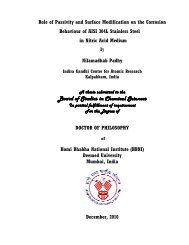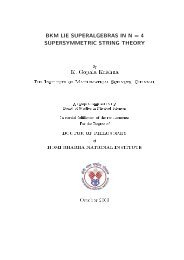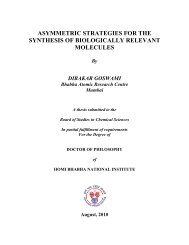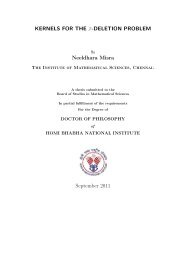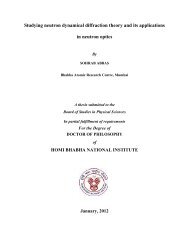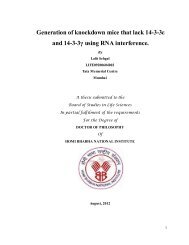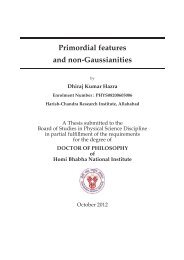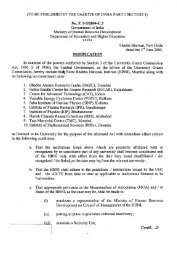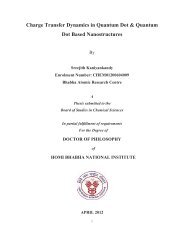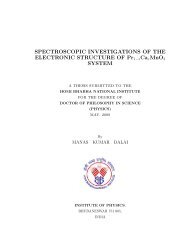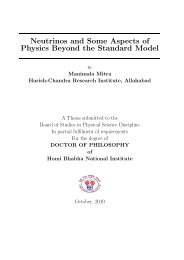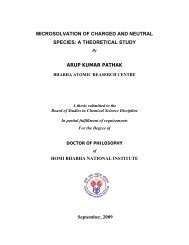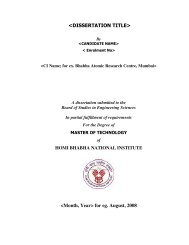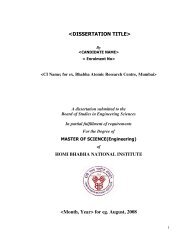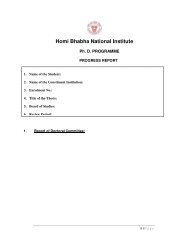LIFE09200604007 Tabish - Homi Bhabha National Institute
LIFE09200604007 Tabish - Homi Bhabha National Institute
LIFE09200604007 Tabish - Homi Bhabha National Institute
Create successful ePaper yourself
Turn your PDF publications into a flip-book with our unique Google optimized e-Paper software.
Review of Literature<br />
2.9.2 Gene involved in detoxification of carcinogens<br />
The metabolism of carcinogens is often divided into three phases:<br />
modification, conjugation, and excretion. These reactions act in concert to detoxify<br />
carcinogens and remove them from system. The phase I enzymes activate the<br />
carcinogens by oxidation, reduction, hydrolysis and/or hydration. In subsequent phase<br />
II reactions, these activated carcinogen metabolites are conjugated with charged species<br />
such as glutathione (GSH), sulfate, glycine, or glucuronic acid. After phase II reactions<br />
the carcinogen conjugates can be excreted from cells in bile or urine. Together these<br />
enzymes are known as carcinogen metabolizing enzymes. Polymorphisms in genes<br />
encoding these enzymes can modify an individual‟s response to carcinogen exposure.<br />
The genes that are undertaken for genotyping in present study are described below:<br />
GSTM1 (Glutathione-S-Transferase-Mu 1)<br />
Glutathione-S-transferases are phase II detoxification enzymes that catalyses<br />
the conjugation of sulfhydryl group of glutathione (GSH) to a wide variety of<br />
carcinogens hence making them water soluble for excretion mainly through urine.<br />
GSTM1 is one of the enzymes of mu class 139 . Loss of GSTM1 enzyme function is due<br />
to homozygous deletion resulting in the GSTM1 null genotype 140 . GSTM1 null<br />
genotype is very well studied in terms of having an association with increased risk of<br />
head neck cancer in population based studies 141-143 . The risk conferred by GSTM1 null<br />
genotype was observed in Asians with head and neck cancer in meta analysis of 22 case<br />
control studies 144 . GSTM1 null genotype is also found to be a risk factor for<br />
developing multiple primary neoplasms in the upper aero-digestive tract in Indian<br />
males using tobacco 7 . In a similar study done on MPN patients, subjects with a single<br />
tumour of head and neck and cancer-free male volunteer, GSTM1 null polymorphism<br />
was found to be associated with MPN 10 . In few studies GSTM1 null genotype is shown<br />
to have an additive interaction with smoking on head and neck cancer risk 145 .<br />
GSTT1 (Glutathione-S-Transferase-Theta 1)<br />
The enzyme encoded by the gene is one of the members of theta class of<br />
GSTs. GSTT1 null genotype is found to be associated with risk for head and neck<br />
cancer 146 . More often GSTT1 polymorphism is evaluated with GSTM1 polymorphism<br />
and represents association with cancers of head and neck 141, 147, 148 . GSTT1 null<br />
genotype confers risk to males with MPN in the head and neck 7 . In the meta-analysis<br />
47



